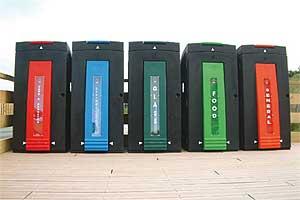The department has now launched a public consultation called Recycle on the Go which invites views on how systems could be set up and managed.
The closing date for feedback is November 2, 2007 with the finalised voluntary scheme taking effect from 2008.
Defra has already had feedback from local authorities and other interested groups and while household and business recycling is considered a priority, there is still interest in a public recycling scheme.
Litter makes up an estimated 3% of the waste and it is viewed by some as a way of cutting the increasing costs of landfill disposal.
Organisations such as The Royal Parks and the Association of Event Venues have already committed to providing public recycling bins.
Examples
In its consultation document, Defra has provided a number of examples of where the scheme is already up-and-running.
These include Cornwall's eco-attraction The Eden Project which has installed recycling bins for cartons, glass, food, cans and plastics. The 140-litre pedal operated bins manufactured by Plastic Omnium are “said to be very eye catching due to the coloured panels that help to highlight the material streams the bins are for. They also have signage on the front and a Braille panel on the top.”
The document also includes some suggestions as to how schemes could be implemented. It proposes using common standards on bins – specifically the logo and colours of the national recycling campaign, Recycle Now.
It adds that Australian research indicates that public place recycling works best with fully commingled collections of “dry” material and that councils might like to start with two materials and build up.
It also explains that in New South Wales, Australia, a three-bin system is in place. Two regular bins have been placed either side of a recycling bin and the idea is that those who want to recycle will make efforts to put recyclables in the middle bin while those who do not will use the outside bins.
The document also states: “Experience from many countries recommends against placing recycling bins and general waste bins back to back, otherwise a recycling bin may be hidden or obscured by a waste bin, or vice versa. It could also make them difficult to empty and/or access.”
It adds that contamination could be reduced by “placing a small barrier to recycling to make the disposal of an item into a general waste bin a slightly easier option”. For
example, bins collecting paper could have letter-box shaped openings to make it difficult for other materials to be disposed of in that container.











Subscribe for free